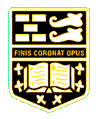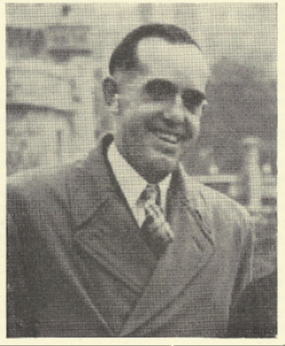|
PRIZE-GIVING—1964
THIS YEAR we were blessed with a fine day, but the proceedings were marred by the news that Mr. Tucker, former General Superintendent of
the Homes, and great friend of our School, had been taken ill and would be unable to be present as guest of honour. However, we were fortunate
in obtaining the services of the Mayor of Hertford, Councillor A. W. Bentley, to take over the duties of Mr. Tucker, and our sincere thanks are
due to Councillor Bentley for stepping into the breach at such short notice.
The pattern of events for our great day was traditionally the same as in previous years, starting with the singing of the National Anthem followed
by the hymn 'O praise ye the Lord!', and the opening prayer.
Chairman of the Goldings Committee, Councillor L. Keeble, J.P., officially opened the proceedings by welcoming all visitors with a few well
chosen words. He then went on to say what an exciting year we had experienced as a nation, with the Olympic's and General Election just
completed, and therefore foremost in our minds, but perhaps most of all the speed of modern development in industry generally, which was
making it an even greater problem for our boys leaving the security of this school, but one which we were facing up to. Mr. Keeble then went
on to report the progress of some of our boys who are now in situations, and out of forty reports fifteen were highly satisfactory, eighteen were
satisfactory, and only three could be classed as unsatisfactory. Mr. Keeble also thought it should be noted what a difficult task our Headmaster
had in attracting the right type of person to our staff. Finally, Mr. Keeble paid tribute to two members of our staff who will be leaving within the
next twelve months. Mr. W. Purkis, who has been a member of our Printing Department for 34 years, and to whom a great many boys are
indebted for starting them on their careers as machine minders, and Mr. R. Newton who is leaving us at Christmas to take up a new position with
the Hertfordshire County Council as Youth Officer, after nine years service as Physical Training Instructor and Warden of the Verney Hostel.
On behalf of all members of the council he wished Mr. Purkis a happy and 'long retirement, and Mr. Newton success in his new job.
Our Headmaster, Mr. R. F. Wheatley, B.Sc., then paid tribute to His Worship the Mayor for stepping into the breach at such short notice, and
deemed it a great honour for the School. Mr. Wheatley then said how sorry we all were that Mr. Tucker had been taken ill and was unable to be
with us, but that he, Mr. Wheatley, would convey to Mr. Tucker on behalf of all present our best wishes for a speedy recovery.
Mr. Wheatley then stated that the object of our School was to endeavour to raise the standard of the boys to a high degree of skill in trade and
scholastic ability. We do not have selection of entry, yet all get the same chance to prove themselves when they get here. It is true that a small
proportion of boys do not take advantage of the facilities, and this is a source of worry and anxiety to the staff, who all show a terrific amount of
patience and inspire enthusiasm. The question of staff is a great problem as the Chairman said, and this is particularly so on the Home side. In the
shops and school the average length of service at the moment including two new members who have been with us only weeks, is 15 years, which
speaks for itself. Although those engaged to work in the Home, where more patience is required, have not such a fine average, there are some
who have given many years, and here Mr. Wheatley instanced 'Skipper' Culver, 19 years, Mr. Whitbread, 34 years, Mr. Jack Cooper, 16 years,
and Mr. Steele and Mr. Clarke 8 years and 4 years each respectively.
The Headmaster then went on to outline the changes we could look forward to. The new School building should be ready for use by September
next. The original classrooms will be fitted out in relation to the skilled trades, so that each boy will have an opportunity to try his hand at several
trades before making a final decision.
Turning to the question of education nationally, Mr. Wheatley asked 'what will the new Minister of Education do for the ordinary chap? What
qualities does the ordinary type need?' and then Mr. Wheatley placed these requirements, as he saw them, under three headings: 1. Right character;
2. Adaptability; 3 Able to put leisure hours to good use. With the school-leaving age to be at 16, then more time must be spent doing practical
work. Adaptability will be a 'must', and boys who are adaptable will be all right.
Adventure training was another aspect of youth education that the School had tackled, and we now had our own centre in North Wales. This
would give all boys a chance to live close to nature, each having the opportunity of trips of six weeks duration during their stay at the School.
Finally Mr. Wheatley thanked a group of workers who were not present at the Prize-giving, the Welfare Officers, all of whom work tremendously
hard, but who are so often overlooked.
The Mayor of Hertford, Councillor A. W, Bentley, than presented the prizes and certificates to the boys and apprentices as listed below. Having
completed the easy part of his task, the Mayor then said a few well-chosen words stating; how sorry he was that events had put him in the spot
to do the talking, when he was hoping to have listened to the words of wisdom from Mr. Tucker. Mr. Bentley said that when he first came to
Hertford 14 years ago some of the first sounds he heard were our bugle calls, and after inquiry was told of our School. He also said that it was
the opinion of some members of the community that Goldings was NOT an asset to the town. However, Mr. Bentley considered that we were
now a great credit to the community of Hertford, and this was due to the work of the Headmaster and staff.
Addressing the boys, Mr. Bentley said that life does not end when you leave Goldings, and that in some respects our boys have an advantage
over their contemporaries who have to make up their minds what they are going to do before they leave school. Other advantages were that they
live in a friendly atmosphere, are not shut off in one little community, and are able to mix with other boys from all over the country, and that they
are trained for their future life, seeing how their companions are being trained in their particular trade. Finally, Mr. Bentley expressed his hope
that all boys would remember their Christian teaching and carry on mixing in a Christian community.
Before the final hymn and blessing, given by the Padre, the Reverend B. Nixon, Mr. L. Embleton, our Deputy Headmaster, proposed a vote of
thanks to Mr. Bentley, and felt sure that his words of advice could be well heeded and that our boys should realize what wonderful opportunities
they have before it is too late.
Afterwards staff and visitors adjourned to the staff room for tea.
GENERAL SUBJECTS
Juniors Science and Mathematics FREDERICK WORKMAN. Art and Technical Drawing DAVID BLOWER
English VICTOR ROWLANDS. Religious Instruction DAVID TATE. Best Progress RALPH SMITH
Physical Training ROBERT HENDRY
Seniors General Standard DEREK HAMMOND. Best Progress GORDON HUGHES. Physical Training DAVID LANGLER
SHOEMAKING AND REPAIRING
Seniors MICHAEL BUTT, GORDON FLETCHER
CARPENTRY
Junior DAVID ENNIS. Senior A ROBERT BUXTON. Senior B ROGER PORTER. Senior C FRANK IORNS
PAINTING AND DECORATING
Junior, JOSEPH LAW Senior DAVID LANGLER
GARDENING
Junior GRAHAM SCOTT. Intermediate RAYMOND MAN. Senior CHRISTOPHER FLORENCE. McMullen Special RAYMOND BOWDEN
PRINTING
Junior Compositor. KEITH McSWEENEY. Junior Machine-minder. ROBERT HENDRY
Senior Compositor. GORDON HUGHES. Senior Machine-minder. MICHAEL COUSINS
Apprentices' Prizes
Machine-minder (fourth year) LESLIE BROWNING. Compositor (fourth year) WILLIAM CHARLTON.
Compositor (fifth year) WINSTON NORTON.
SHEET METAL WORK
Junior WILLIAM CHARLESWORTH. Senior PETER HOWE.
CHAIRMAN'S PRIZE FOR SPECIAL EFFORT: JAMES STREET.
MARY ROWLAND'S MEMORIAL PRIZE: DAVID LANGLER.
PRINTING DEPARTMENT.
CITY AND GUILDS OF LONDON INSTITUTE.
Compositors' Work—Final DAVID MUNDY.
Compositors' Work—Intermediate. (Distinction) WILLIAM CHARLTON.
(Credit) ROBERT ROBER,TS RICHARD ROWLES, RICHARD ROWAN.
Letterpress Machine Work—Intermediate DAVID CHARLTON, DAVID LEE, LESLIE BROWNING.
FEDERATION OF MASTER PRINTERS
Preliminary Technical Knowledge. CLIFFORD SAINSBURY.
GENERAL SUBJECTS
ROYAL SOCIETY OF ARTS
English—Stage 1 PAUL PHILLIPS, GLYN PARRY.
CHILDREN'S ROYAL ACADEMY
Picture accepted and hung, ROBERT McNAMARA.
DUKE OF EDINBURGH AWARD SCHEME
Gold Award GORDON FLETCHER. Silver Award, DAVID LANGLER, FRANK IORNS, ROBERT HENDRY.
|



